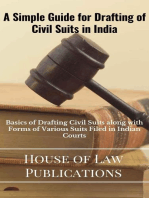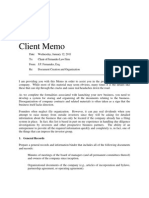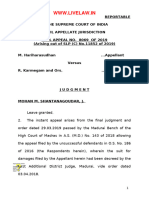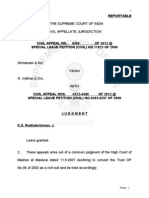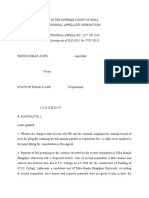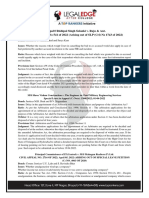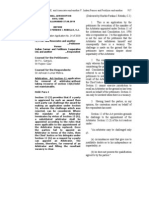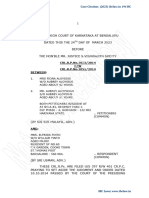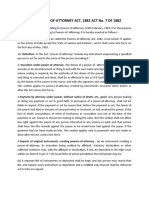Sanction and cognizance
Sanction and cognizance
Uploaded by
sharanmit6630Copyright:
Available Formats
Sanction and cognizance
Sanction and cognizance
Uploaded by
sharanmit6630Copyright
Available Formats
Share this document
Did you find this document useful?
Is this content inappropriate?
Copyright:
Available Formats
Sanction and cognizance
Sanction and cognizance
Uploaded by
sharanmit6630Copyright:
Available Formats
Equivalent Citations
2016 SCC ONLINE SC 908 . 2016 SCC 9 598 . 2016 SCC CRI 3 696 . 2016 SCC L&S 2 837 .
2016 AIR SC 4125 .
L. Narayana Swamy v. State Of Karnataka And Others
Supreme Court Of India (Sep 6, 2016)
CASE NO.
Criminal Appeals No. 721 of 2016 with No. 722 of 2016, decided on September 6, 2016
DISPOSITION
dismissed
ADVOCATES
K.V. Viswanathan and P.V. Shetty, Senior Advocates (Gautam S. Bhardwaj, Bellippa,
Ashwani Kumar, Dhananjay Bhaskar, D.L. Chidananda and Gurudatta Ankolkar,
Advocates) ;
Basava Prabhu S. Patil, Senior Advocate (Joseph Aristotle S., Ms Priya Aristotle, Ms
Shivani Srivastava, Shailesh Madiyal and Chinmay Deshpandey, Advocates)
JUDGES
Dr A.K. Sikri
N.V. Ramana, JJ.
SUMMARY
Before adverting to the question of law that has been raised in these appeals (which is
common to both the cases), we would like to traverse through the facts and the background
which has led to the filing of the present appeals.
Respondent 2 (hereinafter referred to as “the complainant”) filed a complaint on the basis
of which a case has been registered against the appellants, who are Accused 3 and 5, for
the offences punishable under Section 13(1)(d) read with Section 13(2) of the Prevention
of Corruption Act, 1988 (for short “the PC Act”) and Sections 120-B, 427, 447 and 506
read with Section 34 of the Penal Code, 1860. The complaint of the complainant contained
the following allegations.
Not only this, Accused 6 also applied for conversion of use of this very land and the
authorities passed the order of conversion in his favour as well.
Printed by licensee : Prem anand rajaram Page 1 of 16
The appellants herein, along with four other persons, filed Criminal Petition No. 10864 of
2013 before the High Court of Karnataka seeking quashing of the said proceedings.
The High Court has, however, brushed aside the aforesaid contentions taken by the
appellants and dismissed2014 SCC OnLine Kar 12287the petition filed by them. Though
the petition before the High Court was filed jointly by the appellants, they had chosen to
file separate appeals in this Court challenging the said judgment. That is how these two
appeals filed by them are aimed at the same impugned judgment passed by the High Court.
Since requirement of obtaining sanction is contained in Section 19(1) of the PC Act, it
would be proper to reproduce the same.
What is relevant for our purposes is that this section bars taking of cognizance of an
offence. The High Court has taken the view, in the impugned judgment2014 SCC OnLine
Kar 12287 , that bar is from taking cognizance which would not apply at the stage of
investigation by the investigating officer.
The Court took note of the provisions of CrPC i.e. Section 202, which does not permit an
accused person to intervene in the course of inquiry by the Magistrate.
The word “cognizance” occurring in various sections in the Code is a word of wide import.
So far as public servants are concerned, the cognizance of any offence, by any court, is
barred by Section 197 of the Code unless sanction is obtained from the appropriate
authority, if the offence, alleged to have been committed, was in discharge of the official
duty. That is, the complaint cannot be taken notice of. According to Black's Law
Dictionary the word “cognizance” means “jurisdiction” or “the exercise of jurisdiction” or
“power to try and determine causes”.
It is necessary to mention here that taking cognizance of an offence is not the same thing as
issuance of process.
The judgments referred to hereinabove clearly indicate that the word “cognizance” has a
wider connotation and is not merely confined to the stage of taking cognizance of the
offence. When a Special Judge refers a complaint for investigation under Section 156(3)
CrPC, obviously, he has not taken cognizance of the offence and, therefore, it is a pre-
cognizance stage and cannot be equated with post- cognizance stage. Consequently, a
Special Judge referring the case for investigation under Section 156(3) is at pre-cognizance
stage.***21.
Once it is noticed that there was no previous sanction, as already indicated in various
judgments referred to hereinabove, the Magistrate cannot order investigation against a
public servant while invoking powers under Section 156(3) CrPC.
Consequently, a Special Judge referring the case for investigation under Section 156(3) is
at pre-cognizance stage.
In other words, we hold that an order directing further investigation under Section 156(3)
CrPC cannot be passed in the absence of valid sanction.
Printed by licensee : Prem anand rajaram Page 2 of 16
It was also argued that sanction is a weapon to ensure discouragement of frivolous and
vexatious prosecution and is a safeguard for the innocent but not a shield for the guilty.
On the date when charges were framed no sanction under Section 19 of the PC Act was
obtained. This Court put its imprimatur to the aforesaid view of the High Court thereby
dismissing the appeals. It was held that the relevant time is the date on which the
cognizance is taken.
The appeals are without any merit and are dismissed.”
The plea is clearly untenable as Section 19(1) of the Act is time and offence related.25.
The plea is clearly untenable as Section 19(1) of the Act is time and offence related.
Offences prescribed in Sections 161, 164 and 165 IPC and Section 5 of the 1947 Act have
an intimate and inseparable relation with the office of a public servant. These sections
codify a well-recognised truism that power has the tendency to corrupt. The link between
power with opportunity to abuse and the holder of office would be severed by removal
from office. This interrelation between the office and its abuse if severed would render
Section 6 devoid of any meaning. A grant of sanction is not an idle formality but a solemn
and sacrosanct act which removes the umbrella of protection of government servants
against frivolous prosecutions and the aforesaid requirements must therefore, be strictly
complied with before any prosecution could be launched against public servants. That
authority alone would be competent to judge whether on the facts alleged, there has been
an abuse or misuse of office held by the public servant.
The High Court was absolutely right in relying on the decision in Parkash Singh Badal
(2007) 1 SCC 1 , (2007) 1 SCC (Cri) 193 to hold that the appellants in both the appeals
had abused entirely different office or offices than the one which they were holding on the
date on which cognizance was taken and, therefore, there was no necessity of sanction
under Section 19 of the PC Act.
On this basis, it is alleged that these officials have abused their official position. On the
basis of the aforesaid purported defence, therefore, the proceedings cannot be quashed. It
would be a matter of evidence on the basis of which culpability of the appellants shall be
judged.
The aforesaid discussion leads us to the conclusion that the judgment 2014 SCC OnLine
Kar 12287of the High Court though on the issue of obtaining the sanction at the time of
taking cognizance may not be correct insofar as Question (i) formulated above is
concerned, in the facts of the present case, insofar as Question (ii) is concerned, it is rightly
decided. Effect thereof would be to hold that sanction was not needed as the appellants, at
the time of taking cognizance, were not holding the post which is alleged to have been
misused.
As a consequence, these appeals fail and are, accordingly, dismissed with no order as to
costs.
Printed by licensee : Prem anand rajaram Page 3 of 16
JUDGMENT
Dr A.K. Sikri, J.— Before adverting to the question of law that has been raised in these
appeals (which is common to both the cases), we would like to traverse through the facts
and the background which has led to the filing of the present appeals.
2. Respondent 2 (hereinafter referred to as “the complainant”) filed a complaint on the
basis of which a case has been registered against the appellants, who are Accused 3 and 5,
for the offences punishable under Section 13(1) (d) read with Section 13(2) of the
Prevention of Corruption Act, 1988 (for short “the PC Act”) and Sections 120-B, 427, 447
and 506 read with Section 34 of the Penal Code, 1860. The complaint of the complainant
contained the following allegations.
3. One Smt Amararnmal was the original owner of immovable property measuring 259.95
acres in Survey No. 597- B and an area measuring 57.30 acres in Survey No. 601- A of
Bellari, having purchased the same from the Government of India under a registered sale
deed dated 19-1-1940, registered in the Office of the Sub-Registrar, Bellari. The complaint
further states that one Smt Akula Lakshmamma and her children had obtained money
decree against one Pitarnbara Modaliyar and in the execution of the said decree the decree-
holder purchased the land measuring 27.25 acres through court and, thus, became owner of
the said property which is situated at Survey No. 597-B. Out of this 27.25 acres of land, an
area measuring 10 acres of land was later acquired by the Government for forming high
level canal by Thungabhadra Project. However, the Revenue Authorities failed to
demarcate the remaining extent of land measuring 17.25 acres which forced Smt Akula
Lakshmamma and her children to file a suit seeking mandatory injunction. In the
meantime, they sold the said 17.25 acres of land to one Mr Parameshwara Reddy, father-
in- law of Mr Gali Janardhana Reddy. On the same day i.e. on 24-10-2002, Smt Akula
Lakshmamma and her family members also entered into an agreement for sale with
Accused 6 (Mr B. Sriramulu) for an area measuring 27.25 acres, which included 10 acres
of land that had already been acquired by the Government. Thus, Accused 6 entered into
agreement for sale even in respect of the acquired land. Moreover, Accused 6 and Mr Gali
Janardhana Reddy are close friends and, therefore, there was no reason to hold that
Accused 6 was not aware of the transaction between Smt Akula Lakshmamma and Mr
Parameshwara Reddy. Accused 6 filed a suit for specific performance based on the said
agreement to sell in which ex parte decree dated 8-4-2003 came to be passed.
4. On 21-4-2003, Mr Parameshwara Reddy (with whom the first agreement to sell was
entered into) sought for change of land use (though in respect of this very land Accused 6
had filed a suit for specific performance). The then Deputy Commissioner accorded his
permission for change of land use vide order dated 17-6-2003. After this conversion order,
Mr Parameshwara Reddy gifted the entire land measuring 17.25 acres in favour of his
daughter, Smt Gali Laxmi Aruna, w/ o Mr Gali Janardhana Reddy vide gift deed dated
21-3-2006. It is alleged that Accused 6 was fully aware of these facts. Notwithstanding the
same, on the basis of the ex parte decree of specific performance obtained by him, he filed
execution petition and obtained the sale deed from the court in respect of the entire 27.25
Printed by licensee : Prem anand rajaram Page 4 of 16
acres of land. It was notwithstanding the fact that out of this 27.25 acres of land, in respect
of which Accused 6 obtained the sale deed, 17.25 acres was claimed by Mr Parameshwara
Reddy as well and has been gifted to his daughter and the remaining 10 acres of land had
been acquired by the Government. Not only this, Accused 6 also applied for conversion of
use of this very land and the authorities passed the order of conversion in his favour as
well.
5. As on the date of the order of conversion, Accused 6 was holding the post of Cabinet
Minister. It is alleged that because of this reason he could obtain the order of conversion by
exerting influence on the Revenue Authorities. Accused 3 and 5 (the appellants herein) are
the government officials working as Assistant Commissioner and Deputy Director of Land
Records respectively. In respect of the government officials, it is alleged that Accused 1,
Revenue Inspector, had conducted spot inspection on 17-1-2011; Accused 3, who is the
Tahsildar, had recommended case for conversion on the same day and Accused 5, who is
the Assistant Commissioner, had given an endorsement to Accused 6 on the very next day
to the effect that the property in question is not the subject-matter of acquisition. On this
basis, it is alleged that all the officials aided Accused 6 by abusing their official position.
We may state at this stage itself that the appellants cannot argue that there are no
allegations against them in the complaint warranting taking cognizance qua them.
6. On the basis of the aforesaid allegations, prayer was made in the complaint to secure the
presence of the accused persons and the complaint be referred to Karnataka Lokayukta
Police for investigation under Section 156(3) of the Code of Criminal Procedure, 1973 (for
short “CrPC”) since the case required investigatory powers to unearth several other
documents relating to the case.
7. The District and Sessions Judge, Bellari passed order dated 14-6-2003 on the said
complaint thereby referring the same to the Police Inspector, Karnataka Lokayukta Police,
Bellari for further investigation under Section 156(3) CrPC. The jurisdictional police
registered the aforesaid case as Crime No. 9 of 2013 under Section 13(1) (d) read with
Section 13(2) of the PC Act and Sections 120-B, 427, 447 and 506 read with Section 34 of
the Penal Code, 1860. The appellants herein, along with four other persons, filed Criminal
Petition No. 10864 of 2013 before the High Court of Karnataka seeking quashing of the
said proceedings. In this petition, order dated 8-7-2013 Criminal Petition No. 10864 of
2013 was passed observing that during the pendency of the matter, since the police had
filed a final report, those petitioners were at liberty to challenge the final report before the
trial court.
8. According to the appellants, this order was passed by the High Court on erroneous
statement made by the counsel as neither the investigation was completed nor final report
was filed in the court. Therefore, these appellants filed another Criminal Petition No.
101017 of 2014 seeking quashing of the entire proceedings. In the petition, the grounds
taken by the appellants were that there was no allegation of any corrupt practice in the
entire complaint insofar as they are concerned. It was further submitted that before
directing further investigation under Section 156(3) CrPC and taking cognizance of the
Printed by licensee : Prem anand rajaram Page 5 of 16
complaint, the trial court should have satisfied itself that due sanction, as required under
Section 19 of the PC Act read with Section 190 CrPC, has been obtained and since no such
sanction was obtained, such an order for further investigation could not have been passed
by the trial court. It may be mentioned that at the time of filing the complaint, the
appellants had been transferred from the offices which they were holding by virtue of their
promotion. However, they submitted that even on transfer they continued to hold the
public office and, therefore, requirement of obtaining sanction was mandatory.
9. The High Court has, however, brushed aside the aforesaid contentions taken by the
appellants and dismissed 2014 SCC OnLine Kar 12287 the petition filed by them. Though
the petition before the High Court was filed jointly by the appellants, they had chosen to
file separate appeals in this Court challenging the said judgment. That is how these two
appeals filed by them are aimed at the same impugned judgment passed by the High Court.
10. With this factual background, we advert to the questions of law that arise for
consideration:
10.1 (i) Whether an order directing further investigation under Section 156(3) CrPC can be
passed in relation to public servant in the absence of valid sanction and contrary to the
judgments of this Court in Anil Kumar v. M.K. Aiyappa ( 2013) 10 SCC 705 and
Manharibhai Muljibhai Kakadia v. Shaileshbhai Mohanbhai Patel (2012) 10 SCC 517?
10.2 (ii) Whether a public servant who is not on the same post and is transferred (whether
by way of promotion or otherwise to another post) loses the protection under Section 19(1)
of the PC Act, though he continues to be a public servant, albeit on a different post?
11. Since requirement of obtaining sanction is contained in Section 19(1) of the PC Act, it
would be proper to reproduce the same. For our purposes, reproduction of sub-section (1)
of Section 19 of the PC Act shall suffice which we reproduce hereinbelow:
“19. Previous sanction necessary for prosecution.—(1) No court shall take cognizance of
an offence punishable under Sections 7, 10, 11, 13 and 15 alleged to have been committed
by a public servant, except with the previous sanction, save as otherwise provided in the
Lokpal and Lokayuktas Act, 2013—
(a) in the case of a person who is employed in connection with the affairs of the Union and
is not removable from his office save by or with the sanction of the Central Government,
of that Government;
(b) in the case of a person who is employed in connection with the affairs of a State and is
not removable from his office save by or with the sanction of the State Government, of
that Government;
(c) in the case of any other person, of the authority competent to remove him from his
office.”
Printed by licensee : Prem anand rajaram Page 6 of 16
12. As is clear from the plain language of the said section, the court is precluded from
taking “cognizance” of an offence under certain sections mentioned in this provision if the
prosecution is against the public servant, unless previous sanction of the Government
(Central or State , as the case may be) has been obtained. What is relevant for our purposes
is that this section bars taking of cognizance of an offence. The question is whether it will
cover within its sweep, order directing investigation under Section 156(3) CrPC? The High
Court has taken the view, in the impugned judgment 2014 SCC OnLine Kar 12287, that
bar is from taking cognizance which would not apply at the stage of investigation by the
investigating officer. It is observed that sanction is required only after investigation and
that too when, after investigation, it is found that there is substantial truth in the
investigation report as to what amounts to cognizance of offence.
13. The High Court has referred to Section 190 CrPC which stipulates that cognizance of
an offence is to be taken under three contingencies viz. (a) upon receiving a complaint of
facts which constitute such offence, or (b) on the basis of police report stating such facts
which constitute an offence or upon information received from any person other than
police officer, or (c) suo motu when the Magistrate acquires that such an offence has been
committed. This position is clearly discernible from the reading of Section 190 CrPC and
we extract the same hereinbelow:
“190. Cognizance of offences by Magistrates. — (1) Subject to the provisions of this
Chapter, any Magistrate of the First Class, and any Magistrate of the Second Class
specially empowered in this behalf under sub- section (2), may take cognizance of any
offence—
(a) upon receiving a complaint of facts which constitute such offence;
(b) upon a police report of such facts;
(c) upon information received from any person other than a police officer, or upon his own
knowledge, that such offence has been committed.
(2) The Chief Judicial Magistrate may empower any Magistrate of the Second Class to
take cognizance under sub- section (1) of such offences as are within his competence to
inquire into or try.”
14. When a complaint is received, the court records preliminary evidence of the
complainant on the basis of which it satisfies itself as to whether sufficient evidence is
placed on record which may prima facie constitute such offence. Likewise, police report is
filed under Section 173(2) CrPC on the completion of investigation and on perusal thereof,
the Magistrate satisfies himself about the facts which constitute such offence. Similar is the
position in the third contingency. On this basis, the High Court has opined that since prior
sanction is required only at the time of taking cognizance which stage comes much after
the investigation is ordered under Section 156(3) CrPC at the stage of giving direction to
Printed by licensee : Prem anand rajaram Page 7 of 16
investigate into the complaint, such a sanction is not required.
15. The above view taken by the High Court is contrary to the judgments of this Court in
Manharibhai Muljibhai Kakadia (2012) 10 SCC 517 and Anil Kumar (2013) 10 SCC 705.
In Manharibhai Muljibhai Kakadia (2012) 10 SCC 517, the facts were that the respondent
filed before the CJM a criminal complaint alleging that the appellant had, by doing the acts
stated, committed the offences punishable under Sections 420, 467, 468, 471 and 120- B
IPC. The CJM, in exercise of his power under Section 202 CrPC by his order dated
18-6-2004 directed an enquiry to be made by a police inspector. The investigating officer
investigated into the matter and submitted a complaint summary report opining that no
offence was made out. The CJM on 16-4-2005 accepted that report and dismissed the
complaint. The respondent complainant filed a criminal revision petition thereagainst
under Section 397 read with Section 401 CrPC before the High Court. The appellants then
made an application seeking their impleadment as respondents in the revision proceedings
so that they could be heard in the matter. On 5-8-2005 2005 SCC OnLine Guj 280, the
High Court dismissed that application. Against that order, appeal was heard by special
leave. This Court set aside (2012) 10 SCC 517 the order of the High Court permitting the
appellants to be impleaded in the revision proceedings. The Court took note of the
provisions of CrPC i.e. Section 202, which does not permit an accused person to intervene
in the course of inquiry by the Magistrate. However, it was held that even while directing
inquiry, the Magistrate applies his judicial mind on the complaint and, therefore, it would
amount to taking cognizance of the matter. In this context, the Court explained the word
“cognizance” in the following manner: (Manharibhai Muljibhai Kakadia case ( 2012) 10
SCC 517)
“34
. The word “cognizance” occurring in various sections in the Code is a word of wide
import. It embraces within itself all powers and authority in exercise of jurisdiction and
taking of authoritative notice of the allegations made in the complaint or a police report or
any information received that an offence has been committed. In the context of Sections
200, 202 and 203, the expression “taking cognizance” has been used in the sense of taking
notice of the complaint or the first information report or the information that an offence has
been committed on application of judicial mind. It does not necessarily mean issuance of
process.”
16. The second judgment in Anil Kumar (2013) 10 SCC 705 referred to above is directly
on the point. In that case, identical question had fallen for consideration viz. whether
sanction under Section 19 of the PC Act is a precondition for ordering investigation against
a public servant under Section 156(3) CrPC even at pre-cognizance stage? Answering the
question in the affirmative, the Court discussed the legal position in the following manner:
( & 713-14, paras 13-15 & 21)
“13. The expression “cognizance” which appears in Section 197 CrPC came up for
Printed by licensee : Prem anand rajaram Page 8 of 16
consideration before a three-Judge Bench of this Court in State Of Uttar Pradesh v. Paras
Nath Singh . (2009) 6 SCC 372 and this Court expressed the following view:
‘6. … “10. … And the jurisdiction of a Magistrate to take cognizance of any offence is
provided by Section 190 of the Code, either on receipt of a complaint, or upon a police
report or upon information received from any person other than a police officer, or upon
his knowledge that such offence has been committed. So far as public servants are
concerned, the cognizance of any offence, by any court, is barred by Section 197 of the
Code unless sanction is obtained from the appropriate authority, if the offence, alleged to
have been committed, was in discharge of the official duty. The section not only specifies
the persons to whom the protection is afforded but it also specifies the conditions and
circumstances in which it shall be available and the effect in law if the conditions are
satisfied. The mandatory character of the protection afforded to a public servant is brought
out by the expression, “no court shall take cognizance of such offence except with the
previous sanction”. Use of the words “no” and “shall” makes it abundantly clear that the
bar on the exercise of power of the court to take cognizance of any offence is absolute and
complete. The very cognizance is barred. That is, the complaint cannot be taken notice of.
According to Black's Law Dictionary the word “cognizance” means “jurisdiction” or “the
exercise of jurisdiction” or “power to try and determine causes”. In common parlance, it
means taking notice of. A court, therefore, is precluded from entertaining a complaint or
taking notice of it or exercising jurisdiction if it is in respect of a public servant who is
accused of an offence alleged to have been committed during discharge of his official
duty.”’
14. In State of W.B. v. Mohd. Khalid ( 1995) 1 SCC 684 , this Court has observed as
follows:
‘13. It is necessary to mention here that taking cognizance of an offence is not the same
thing as issuance of process. Cognizance is taken at the initial stage when the Magistrate
applies his judicial mind to the facts mentioned in a complaint or to a police report or upon
information received from any other person that an offence has been committed. The
issuance of process is at a subsequent stage when after considering the material placed
before it the court decides to proceed against the offenders against whom a prima facie
case is made out.’
The meaning of the said expression was also considered by this Court in Subramanian
Swamy case (2012) 3 SCC 64.
15. The judgments referred to hereinabove clearly indicate that the word “cognizance” has
Printed by licensee : Prem anand rajaram Page 9 of 16
a wider connotation and is not merely confined to the stage of taking cognizance of the
offence. When a Special Judge refers a complaint for investigation under Section 156(3)
CrPC, obviously, he has not taken cognizance of the offence and, therefore, it is a pre-
cognizance stage and cannot be equated with post-cognizance stage. When a Special Judge
takes cognizance of the offence on a complaint presented under Section 200 CrPC and the
next step to be taken is to follow up under Section 202 CrPC. Consequently, a Special
Judge referring the case for investigation under Section 156(3) is at pre-cognizance stage.
***
21. The learned Senior Counsel appearing for the appellants raised the contention that the
requirement of sanction is only procedural in nature and hence, directory or else Section
19(3) would be rendered otiose. We find it difficult to accept that contention. Sub-section
(3) of Section 19 has an object to achieve, which applies in circumstances where a Special
Judge has already rendered a finding, sentence or order. In such an event, it shall not be
reversed or altered by a court in appeal, confirmation or revision on the ground of absence
of sanction. That does not mean that the requirement to obtain sanction is not a mandatory
requirement. Once it is noticed that there was no previous sanction, as already indicated in
various judgments referred to hereinabove, the Magistrate cannot order investigation
against a public servant while invoking powers under Section 156(3) CrPC. The above
legal position, as already indicated, has been clearly spelt out in Paras Nath Singh (2009) 6
SCC 372 and Subramanian Swamy (2012) 3 SCC 64 cases.”
Having regard to the ratio of the aforesaid judgment ( 2013) 10 SCC 705 , we have no
hesitation in answering the questions of law, as formulated in para 10 above, in the
negative. In other words, we hold that an order directing further investigation under
Section 156(3) CrPC cannot be passed in the absence of valid sanction.
17. With this, we now address the second question i.e. whether the public servant not being
in the same post, when the offence was allegedly committed, though continuing as a public
servant, loses the protection under Section 19(1) of the PC Act? The contention of the
respondents was that sanction under Section 19 of the PC Act is not required as the
appellants have been transferred from the post which they were holding at the relevant
time. In support of their plea that even on transfer/promotion, the appellants remain public
servant, such a sanction was required, it was submitted that the object of Section 19 of the
PC Act is to protect public servant from harassment and, therefore, exercise of powers
under Section 19 of the PC Act is not an empty formality. Since the Government, as a
sanctioning authority, is supposed to apply its mind to the entire material and evidence
placed before it and on examination thereof, it is to reach the conclusion as to whether the
sanction is accorded or not. It was also argued that sanction is a weapon to ensure
discouragement of frivolous and vexatious prosecution and is a safeguard for the innocent
Printed by licensee : Prem anand rajaram Page 10 of 16
but not a shield for the guilty. In support of the aforesaid arguments, reliance was placed
on State Of Himachal Pradesh v. Nishant Sareen . ( 2010) 14 SCC 527 and Mansukhlal
Vithaldas Chauhan v. State Of Gujarat . (1997) 7 SCC 622.
18. The aforesaid judgments referred to by the appellants state the general proposition of
law and purpose behind Section 19 of the PC Act. On the other hand, so far as the question
that needs to be answered is concerned, we find that the same very question came up for
consideration in Abhay Singh Chautala v. Central Bureau Of Investigation . (2011) 7 SCC
141. In that case, the appellants were MLAs when charges under the PC Act were framed
against them. However the charges pertained to wrongdoing committed during earlier
periods of time during which they had also been MLAs or MPs. The charges did not
pertain to their current tenure as MLAs during which the charges were framed and trial
initiated. On the date when charges were framed no sanction under Section 19 of the PC
Act was obtained. An objection regarding the absence of sanction was raised before the
Special Judge, who in the common order held that the charge- sheet did not contain the
allegation that the appellants had abused their current office as MLAs and, therefore, no
sanction was necessary. The High Court by the impugned order under Section 482 CrPC
did not interfere with the said prosecution. This Court put its imprimatur to the aforesaid
view of the High Court thereby dismissing the appeals. After discussing a catena of
judgments, it was held that even when the appellants in that case held more than one office
during the check period which they are alleged to have abused; however, there will be no
requirement of sanction if on the date when the cognizance is taken, they are not
continuing to hold that very office. It was held that the relevant time is the date on which
the cognizance is taken. If on that date, the appellant was not a public servant, there was no
question of any sanction. It was also held that even if he continues to be a public servant
but in a different capacity or is holding a different office than the one which is alleged to
have been abused, still there would be no question of sanction. This can be found from the
reading of paras 54 and 56 of the judgment in Abhay Singh Chautala (2011) 7 SCC 141
which we reproduce below:
“54. The learned Senior Counsel tried to support their argument on the basis of the theory
of “legal fiction”. We do not see as to how the theory of “legal fiction” can work in this
case. It may be that the appellants in this case held more than one offices during the check
period which they are alleged to have abused; however, there will be no question of any
doubt if on the date when the cognizance is taken, they are not continuing to hold that very
office. The relevant time, as held in S.A Venkataraman v. State .AIR 1958 SC 107, 1958
Cri LJ 254, is the date on which the cognizance is taken. If on that date, the appellant is not
a public servant, there will be no question of any sanction. If he continues to be a public
servant but in a different capacity or holding a different office than the one which is
alleged to have been abused, still there will be no question of sanction and in that case,
there will also be no question of any doubt arising because the doubt can arise only when
the sanction is necessary. In case of the present appellants, there was no question of there
Printed by licensee : Prem anand rajaram Page 11 of 16
being any doubt because basically there was no question of the appellants’ getting any
protection by a sanction.
***
56. Thus, we are of the clear view that the High Court was absolutely right in relying on
the decision in Parkash Singh Badal v. State of Punjab (2007) 1 SCC 1 to hold that the
appellants in both the appeals had abused entirely different office or offices than the one
which they were holding on the date on which cognizance was taken and, therefore, there
was no necessity of sanction under Section 19 of the Act as held in K. Karunakaran v.
State Of Kerala . (2007) 1 SCC 59 and the later decision in Parkash Singh Badal v. State of
Punjab (2007) 1 SCC 1. The appeals are without any merit and are dismissed.”
19. In the aforesaid extracted para 54 there is a reference to the judgment of this Court in
S.A. Venkataraman AIR 1958 SC 107 , 1958 Cri LJ 254. In that case, the issue was
considered in the context of the PC Act wherein the relevant provision, corresponding to
Section 19 of the present PC Act, was Section 6. Interpreting the provisions of Section 6,
this Court held that even when a purported offence is committed by a person at the time he
was a public servant, but he ceases to be a public servant on the date when cognizance of
the offence alleged to have been committed is taken by the court, no such sanction was
required.
20. Likewise, in Parkash Singh Badal v. State of Punjab (2007) 1 SCC 1, the contention of
the appellant in that case that permission to obtain sanction throughout service was
necessary, was negatived in the following manner:
“24. The plea is clearly untenable as Section 19(1) of the Act is time and offence related.
25. Section 19(1) of the Act has been quoted above.
26. The underlying principle of Sections 7, 10, 11, 13 and 15 have been noted above. Each
of the above sections indicates that the public servant taking gratification (Section 7),
obtaining valuable thing without consideration (Section 11), committing acts of criminal
misconduct (Section 13) are acts performed under the colour of authority but which in
reality are for the public servant's own pleasure or benefit. Sections 7, 10, 11, 13 and 15
apply to aforestated acts. Therefore, if a public servant in his subsequent position is not
accused of any such criminal acts then there is no question of invoking the mischief rule.
Protection to public servants under Section 19(1)(a) has to be confined to the time-related
criminal acts performed under the colour or authority for public servant's own pleasure or
benefit as categorised under Sections 7, 10, 11, 13 and 15. This is the principle behind the
test propounded by this Court, namely, the test of abuse of office.”
(emphasis in original)
Printed by licensee : Prem anand rajaram Page 12 of 16
21. It clearly follows from the reading of the judgments in Abhay Singh Chautala (2011) 7
SCC 141 and Parkash Singh Badal (2007) 1 SCC 1 that if the public servant had abused
entirely different office or offices than the one which he was holding on the date when
cognizance was taken, there was no necessity of sanction under Section 19 of the PC Act.
It is also made clear that where the public servant had abused the office which he held in
the check-up period, but had ceased to hold “that office” or was holding a different office,
then sanction would not be necessary. Likewise, where the alleged misconduct is in some
different capacity than the one which is held at the time of taking cognizance, there will be
no necessity to take the sanction. However, one discerning factor which is to be noted is
that in both these cases the accused persons were public servants in the capacity of
Member of Legislative Assembly by virtue of political office. They were not public
servants as government employees. However, a detailed discussion contained in these
judgments would indicate that the principle laid down therein would encompass and cover
the cases of all public servants, including government employees who may otherwise be
having constitutional protection under the provisions of Articles 309 and 311 of the
Constitution.
22. To illustrate, we may quote the following passage from the judgment of this Court in
R.S. Nayak v. A.R. Antulay ( 1984) 2 SCC 183 , which is reproduced along with other
paragraphs from the judgment in Parkash Singh Badal (2007) 1 SCC 1: (Parkash Singh
Badal case (2007) 1 SCC 1)
“16
. ‘23
. Offences prescribed in Sections 161, 164 and 165 IPC and Section 5 of the 1947 Act have
an intimate and inseparable relation with the office of a public servant. A public servant
occupies office which renders him a public servant and occupying the office carries with it
the powers conferred on the office. Power generally is not conferred on an individual
person. In a society governed by rule of law power is conferred on office or acquired by
statutory status and the individual occupying the office or on whom status is conferred
enjoys the power of office or power flowing from the status. The holder of the office alone
would have opportunity to abuse or misuse the office. These sections codify a well-
recognised truism that power has the tendency to corrupt. It is the holding of the office
which gives an opportunity to use it for corrupt motives. Therefore, the corrupt conduct is
directly attributable and flows from the power conferred on the office. This interrelation
and interdependence between individual and the office he holds is substantial and not
severable. Each of the three clauses of sub- section (1) of Section 6 uses the expression
“office” and the power to grant sanction is conferred on the authority competent to remove
the public servant from his office and Section 6 requires a sanction before taking
cognizance of offences committed by public servant. The offence would be committed by
Printed by licensee : Prem anand rajaram Page 13 of 16
the public servant by misusing or abusing the power of office and it is from that office, the
authority must be competent to remove him so as to be entitled to grant sanction. The
removal would bring about cessation of interrelation between the office and abuse by the
holder of the office. The link between power with opportunity to abuse and the holder of
office would be severed by removal from office. Therefore, when a public servant is
accused of an offence of taking gratification other than legal remuneration for doing or
forbearing to do an official act (Section 161 IPC) or as a public servant abets offences
punishable under Sections 161 and 163 (Section 164 IPC) or as public servant obtains a
valuable thing without consideration from person concerned in any proceeding or business
transacted by such public servant (Section 165 IPC) or commits criminal misconduct as
defined in Section 5 of the 1947 Act, it is implicit in the various offences that the public
servant has misused or abused the power of office held by him as public servant. The
expression “office” in the three sub-clauses of Section 6(1) would clearly denote that office
which the public servant misused or abused for corrupt motives for which he is to be
prosecuted and in respect of which a sanction to prosecute him is necessary by the
competent authority entitled to remove him from that office which he has abused. This
interrelation between the office and its abuse if severed would render Section 6 devoid of
any meaning. And this interrelation clearly provides a clue to the understanding of the
provision in Section 6 providing for sanction by a competent authority who would be able
to judge the action of the public servant before removing the bar, by granting sanction, to
the taking of the cognizance of offences by the court against the public servant. Therefore,
it unquestionably follows that the sanction to prosecute can be given by an authority
competent to remove the public servant from the office which he has misused or abused
because that authority alone would be able to know whether there has been a misuse or
abuse of the office by the public servant and not some rank outsider. By a catena of
decisions, it has been held that the authority entitled to grant sanction must apply its mind
to the facts of the case, evidence collected and other incidental facts before according
sanction. A grant of sanction is not an idle formality but a solemn and sacrosanct act which
removes the umbrella of protection of government servants against frivolous prosecutions
and the aforesaid requirements must therefore, be strictly complied with before any
prosecution could be launched against public servants. (See
Mohd. Iqbal Ahmed v. State of A.P
.(
1979) 4 SCC 172
) The legislature advisedly conferred power on the authority competent to remove the
Printed by licensee : Prem anand rajaram Page 14 of 16
public servant from the office to grant sanction for the obvious reason that that authority
alone would be able, when facts and evidence are placed before him, to judge whether a
serious offence is committed or the prosecution is either frivolous or speculative. That
authority alone would be competent to judge whether on the facts alleged, there has been
an abuse or misuse of office held by the public servant. That authority would be in a
position to know what was the power conferred on the office which the public servant
holds, how that power could be abused for corrupt motive and whether prima facie it has
been so done. That competent authority alone would know the nature and functions
discharged by the public servant holding the office and whether the same has been abused
or misused. It is the vertical hierarchy between the authority competent to remove the
public servant from that office and the nature of the office held by the public servant
against whom sanction is sought which would indicate a hierarchy and which would
therefore, permit inference of knowledge about the functions and duties of the office and
its misuse or abuse by the public servant. That is why the legislature clearly provided that
that authority alone would be competent to grant sanction which is entitled to remove the
public servant against whom sanction is sought from the office.’ (R.S. Nayak case (
1984) 2 SCC 183
)”
23. In the case of the present appellants, there was no question of the appellants' getting
any protection by a sanction. The High Court was absolutely right in relying on the
decision in Parkash Singh Badal (2007) 1 SCC 1 to hold that the appellants in both the
appeals had abused entirely different office or offices than the one which they were
holding on the date on which cognizance was taken and, therefore, there was no necessity
of sanction under Section 19 of the PC Act. Where the public servant had abused the office
which he held in the check period but had ceased to hold “that office” or was holding a
different office, then a sanction would not be necessary. Where the alleged misconduct is
in some different capacity than the one which is held at the time of taking cognizance,
there will be no necessity to take the sanction.
24. Insofar as the argument of the appellants that there is no specific averment in the
complaint for having committed the alleged act by them is concerned, we are unable to
agree with this argument. As already pointed out above, the allegations against these two
appellants are that after conducting spot inspection by Accused 1 on 17-1-2003, the first
appellant (Accused 3) who was working as Tahsildar had recommended it on the same day
and thereafter the second appellant (Accused 6) who was working as Assistant
Commissioner had given an endorsement on the very next day to the effect that property is
not the subject- matter of acquisition. On this basis, it is alleged that these officials have
abused their official position. We may record that the learned counsel for the appellants
have contended that they merely acted on the court decree. However, it may be two
Printed by licensee : Prem anand rajaram Page 15 of 16
innocent explanations on the facts of this case as alleged in the case inasmuch as it is
alleged that these two appellants did not bother to find out that there were two decrees in
two different names in respect of the same land and further that 10 acres of land in
question had already been acquired and could not be the subject-matter of decree. These
were the aspects which were, prima facie, to be looked into by these appellants. On the
basis of the aforesaid purported defence, therefore, the proceedings cannot be quashed. It
would be a matter of evidence on the basis of which culpability of the appellants shall be
judged.
25. The aforesaid discussion leads us to the conclusion that the judgment 2014 SCC
OnLine Kar 12287 of the High Court though on the issue of obtaining the sanction at the
time of taking cognizance may not be correct insofar as Question (i) formulated above is
concerned, in the facts of the present case, insofar as Question (ii) is concerned, it is rightly
decided. Effect thereof would be to hold that sanction was not needed as the appellants, at
the time of taking cognizance, were not holding the post which is alleged to have been
misused.
26. As a consequence, these appeals fail and are, accordingly, dismissed with no order as
to costs.
Printed by licensee : Prem anand rajaram Page 16 of 16
You might also like
- Annex A EXAMPLE FORM OF PARENT COMPANY GUARANTEEDocument1 pageAnnex A EXAMPLE FORM OF PARENT COMPANY GUARANTEEsktung100% (1)
- Simple Guide for Drafting of Civil Suits in IndiaFrom EverandSimple Guide for Drafting of Civil Suits in IndiaRating: 4.5 out of 5 stars4.5/5 (4)
- Abrogar Vs Cosmos BottlingDocument2 pagesAbrogar Vs Cosmos BottlingLeihriza Argueza Urban100% (1)
- Motion For Reconsideration FormatDocument3 pagesMotion For Reconsideration FormatKendrick Siao100% (1)
- Affadivit For PMAYDocument4 pagesAffadivit For PMAYAndrews ThanapragasamNo ratings yet
- Sentul Point June16 AgentDocument57 pagesSentul Point June16 AgentNanthini PalanisamyNo ratings yet
- Fernandes Law Client Memo Re Document CreationDocument4 pagesFernandes Law Client Memo Re Document Creationpeaser0712No ratings yet
- Lawteller June 2022Document52 pagesLawteller June 2022bjornNo ratings yet
- Sanction 156 3 KSRDocument17 pagesSanction 156 3 KSRLive Law100% (1)
- Brinda Karat Vs State Hate Speech FIR Order 1Document6 pagesBrinda Karat Vs State Hate Speech FIR Order 1Jappreet SinghNo ratings yet
- Saurabh Mukund Vs Directorate of Enforcement Thru Its Joint Director Lko Allahabad High Court 531867Document19 pagesSaurabh Mukund Vs Directorate of Enforcement Thru Its Joint Director Lko Allahabad High Court 531867RamNo ratings yet
- Millenium General Supplies (T) LTD Vs Nas Tyres Services (T) LTD and Another (Misc Civil Application No 813 of 2024) 2024 TZHC 5444 (19 April 2024)Document17 pagesMillenium General Supplies (T) LTD Vs Nas Tyres Services (T) LTD and Another (Misc Civil Application No 813 of 2024) 2024 TZHC 5444 (19 April 2024)Katlego BarutiNo ratings yet
- Yapi SKredi Bank vs. Ashok K. ChauhanDocument21 pagesYapi SKredi Bank vs. Ashok K. ChauhanMADHUSUDAN RAINo ratings yet
- Sanjay Suri and Ors Vs State and Ors 29012010 DELD100073COM755498Document12 pagesSanjay Suri and Ors Vs State and Ors 29012010 DELD100073COM755498Anubhav SinghNo ratings yet
- PDF Upload-365966Document21 pagesPDF Upload-365966Anubhav Kumar DasNo ratings yet
- BSNL v. Parmod v. SawantDocument13 pagesBSNL v. Parmod v. SawantKaran GuptaNo ratings yet
- 364 2009 12 1501 16072 Judgement 19-Aug-2019 PDFDocument13 pages364 2009 12 1501 16072 Judgement 19-Aug-2019 PDFGulam ImamNo ratings yet
- 138 - Quash U:s 482Document6 pages138 - Quash U:s 482ragul rajesNo ratings yet
- Quashing and Cancellation of Fir in India: A Study of Legislative and Judicial TrendsDocument14 pagesQuashing and Cancellation of Fir in India: A Study of Legislative and Judicial TrendsJinal SanghviNo ratings yet
- Typing Given by Neema MamDocument36 pagesTyping Given by Neema MamShivaniNo ratings yet
- Rules, Section 98 of The Civil Procedure Act and Section 33 of The Judicature Act. It Seeks ToDocument7 pagesRules, Section 98 of The Civil Procedure Act and Section 33 of The Judicature Act. It Seeks ToKellyNo ratings yet
- AssignmentDocument21 pagesAssignmentSol-sanam QadirNo ratings yet
- A Suit and Original Petition Distinguished 2012 SCDocument8 pagesA Suit and Original Petition Distinguished 2012 SCSridhara babu. N - ಶ್ರೀಧರ ಬಾಬು. ಎನ್No ratings yet
- 1004 Solomon Selvaraj V Indrani Bhagawan Singh 3 Dec 2022 447418Document4 pages1004 Solomon Selvaraj V Indrani Bhagawan Singh 3 Dec 2022 447418Madhusudan ReddyNo ratings yet
- Shipra Hotels Limited and Anther V State of Up and 3 Others and Other Connected Matters Allahabad High Court 446911Document38 pagesShipra Hotels Limited and Anther V State of Up and 3 Others and Other Connected Matters Allahabad High Court 446911Gautam016No ratings yet
- Legal Ethics 02Document8 pagesLegal Ethics 02riyanriyaz012No ratings yet
- Vidyabai - and - Ors - Vs - Padmalatha - and - Ors - 12122008 - Ss081749COM444438Document7 pagesVidyabai - and - Ors - Vs - Padmalatha - and - Ors - 12122008 - Ss081749COM444438Vijay Kumar ChoudharyNo ratings yet
- STAUTORY BAIL MUST BE GRANTED - Judgement - 26-Apr-2023Document22 pagesSTAUTORY BAIL MUST BE GRANTED - Judgement - 26-Apr-2023athishNo ratings yet
- Arbitrator Cannot Go Beyond Point of ReferenceDocument4 pagesArbitrator Cannot Go Beyond Point of Referencesneh guptaNo ratings yet
- 2014-Binod Kumar & Ors Vs State of BiharDocument9 pages2014-Binod Kumar & Ors Vs State of BiharPRASHANT SAURABHNo ratings yet
- 305 Vijay Kumar Ghai V State of West Bengal 22 Mar 2022 412838Document19 pages305 Vijay Kumar Ghai V State of West Bengal 22 Mar 2022 412838Aoman BoroNo ratings yet
- DR Meraj Ali Anr V State of UPDocument9 pagesDR Meraj Ali Anr V State of UPradiant3086No ratings yet
- Rathish Babu Unnikrishnan Vs The State Govt of NCT of Delhi On 26 April 2022Document6 pagesRathish Babu Unnikrishnan Vs The State Govt of NCT of Delhi On 26 April 2022onevikasNo ratings yet
- VIKASH SINGH vs. THE STATE OF UTTAR PRADESHDocument4 pagesVIKASH SINGH vs. THE STATE OF UTTAR PRADESHdanishsayed4160No ratings yet
- MP High Court Section 327Document7 pagesMP High Court Section 327infoNo ratings yet
- Ba LLB Research Paper (CRPC) (2019-2024)Document9 pagesBa LLB Research Paper (CRPC) (2019-2024)SUDHANSHU SINGHNo ratings yet
- Ranjeet V State of Upwatermark 1590728 - 240217 - 220221Document5 pagesRanjeet V State of Upwatermark 1590728 - 240217 - 220221pdpraoNo ratings yet
- ADV ALTAF SB Crusher Matter.Document9 pagesADV ALTAF SB Crusher Matter.ahtshamNo ratings yet
- Zambia Cargo Logistic Co LTD Vs Tanzania Tea Blenders (2002) LTD Another (Civil Review 27 of 2018) 2019 TZHC 36 (17 October 2019)Document10 pagesZambia Cargo Logistic Co LTD Vs Tanzania Tea Blenders (2002) LTD Another (Civil Review 27 of 2018) 2019 TZHC 36 (17 October 2019)Jeremy Vanelly Via AniluvNo ratings yet
- 2024 INSC 278: CRL. APPEAL NOS.1565-67 of 2024 Page 1 of 14Document14 pages2024 INSC 278: CRL. APPEAL NOS.1565-67 of 2024 Page 1 of 14Richa sharmaNo ratings yet
- Probate ProbateDocument4 pagesProbate Probatericha ayengiaNo ratings yet
- 2023 Latest Caselaw 4652 MadDocument19 pages2023 Latest Caselaw 4652 Madsathish15779No ratings yet
- April Judgements (1) - 1Document19 pagesApril Judgements (1) - 1AbhijitNo ratings yet
- Section 2 (J), Limitation Act, 1963 LS Synthetics LTD V Fairgrowth Financial Services LTD, 2004 (SCC) - ASK Krihnappa Chettair V SVV Somiah, AIR 1964 SCDocument23 pagesSection 2 (J), Limitation Act, 1963 LS Synthetics LTD V Fairgrowth Financial Services LTD, 2004 (SCC) - ASK Krihnappa Chettair V SVV Somiah, AIR 1964 SCAhat SharmaNo ratings yet
- CRM M 40527 2023Document8 pagesCRM M 40527 2023Kanade KanadeNo ratings yet
- Miscellaneous Civil Application 685 of 2017Document10 pagesMiscellaneous Civil Application 685 of 2017Joshua Malidzo NyawahNo ratings yet
- Clre (A) 392 2015Document19 pagesClre (A) 392 2015Thiru The PranksterNo ratings yet
- Robert Kadaso Mageni Vs Republic (Criminal Appeal No476 of 2023) 2023 TZCA 1750Document9 pagesRobert Kadaso Mageni Vs Republic (Criminal Appeal No476 of 2023) 2023 TZCA 1750nemynemo620No ratings yet
- JudgementDocument8 pagesJudgementRituraj MishraNo ratings yet
- Rajesh Bhatia and Ors Vs G Parimala and Ors 301120a051013COM203082 PDFDocument19 pagesRajesh Bhatia and Ors Vs G Parimala and Ors 301120a051013COM203082 PDFUtkarsh KhandelwalNo ratings yet
- PDF Upload 362689Document8 pagesPDF Upload 362689Shahzeb SaifiNo ratings yet
- Ahc-498a WuashingDocument16 pagesAhc-498a WuashingNarendra SinghNo ratings yet
- Ni Act Judgment on LiabilityDocument24 pagesNi Act Judgment on LiabilitybsprversovaNo ratings yet
- Pratyush BriefsDocument2 pagesPratyush BriefsSATRAJEET SENNo ratings yet
- Indian Law Report - Allahabad Series - Sep2010Document110 pagesIndian Law Report - Allahabad Series - Sep2010PrasadNo ratings yet
- Fraud and Rejection of Plaint SC Cs-Ramaswamy-V-Vk-Senthil-30-Sep-2022-437907Document8 pagesFraud and Rejection of Plaint SC Cs-Ramaswamy-V-Vk-Senthil-30-Sep-2022-437907santoshthatiNo ratings yet
- Case Law On Production of Documents 1Document4 pagesCase Law On Production of Documents 1advsagaranandNo ratings yet
- General Power of Attorney Can Sub-DellegateDocument3 pagesGeneral Power of Attorney Can Sub-DellegateYash GandhiNo ratings yet
- CRL.R.P.No.1053/2014 C/W CRL.R.P.No.1052/2014 Between:: Case Citation: (2023) Ibclaw - in 196 HCDocument27 pagesCRL.R.P.No.1053/2014 C/W CRL.R.P.No.1052/2014 Between:: Case Citation: (2023) Ibclaw - in 196 HCBarira ParvezNo ratings yet
- 2019 5 1501 37183 Judgement 11-Aug-2022Document17 pages2019 5 1501 37183 Judgement 11-Aug-2022Rohit kumar SharmaNo ratings yet
- Susela Padmavathy Amma V Bharti Airtel Limitedwatermark 1600371Document21 pagesSusela Padmavathy Amma V Bharti Airtel Limitedwatermark 1600371Vivek TiwariNo ratings yet
- wp3519 24 19 07 2024 1 551159Document41 pageswp3519 24 19 07 2024 1 551159somattorneyNo ratings yet
- Trial of Public Servant With Invalid Sanction Is Null and Void and Non-Est Second Trial Is Permissible With Valid Sanction - SCDocument27 pagesTrial of Public Servant With Invalid Sanction Is Null and Void and Non-Est Second Trial Is Permissible With Valid Sanction - SCLive Law100% (1)
- Remedies Against156 (3 ApplicationDocument3 pagesRemedies Against156 (3 ApplicationGargi sharmaNo ratings yet
- California Supreme Court Petition: S173448 – Denied Without OpinionFrom EverandCalifornia Supreme Court Petition: S173448 – Denied Without OpinionRating: 4 out of 5 stars4/5 (1)
- Introduction to Negotiable Instruments: As per Indian LawsFrom EverandIntroduction to Negotiable Instruments: As per Indian LawsRating: 5 out of 5 stars5/5 (1)
- Certification: Entry Number Date TimeDocument2 pagesCertification: Entry Number Date TimeDolores PulisNo ratings yet
- XITAC'24 Event Brochure Amended - CompressedDocument59 pagesXITAC'24 Event Brochure Amended - CompressedShourjo RoychaudhuriNo ratings yet
- Kenya Supreme Court Elections Ruling 2017Document4 pagesKenya Supreme Court Elections Ruling 2017The Independent MagazineNo ratings yet
- Duque v. Spouses YuDocument2 pagesDuque v. Spouses YuRienaNo ratings yet
- Sample California Complaint For Theft of Trade SecretsDocument3 pagesSample California Complaint For Theft of Trade SecretsStan BurmanNo ratings yet
- Powers of Attorney ActDocument2 pagesPowers of Attorney ActjaspalkalerNo ratings yet
- Property B Lecture 1Document25 pagesProperty B Lecture 1Maya GraorNo ratings yet
- People V PascualDocument9 pagesPeople V PascualNikki Estores GonzalesNo ratings yet
- Young v. United Parcel Services, Inc., 10th Cir. (2011)Document11 pagesYoung v. United Parcel Services, Inc., 10th Cir. (2011)Scribd Government DocsNo ratings yet
- Affidavit - Criminal Transfer Petition (SC)Document2 pagesAffidavit - Criminal Transfer Petition (SC)Tirtha Mukherjee100% (1)
- Employee Misconduct and Disciplinary ProcedureDocument20 pagesEmployee Misconduct and Disciplinary ProcedureAngel GondaNo ratings yet
- NLC Lawsuit Gorelik Apr 26 2017 PDFDocument20 pagesNLC Lawsuit Gorelik Apr 26 2017 PDFRecordTrac - City of OaklandNo ratings yet
- CasesDocument8 pagesCasesRichelle de VeraNo ratings yet
- ...Document3 pages...Yassin MalayNo ratings yet
- Defenses To Criminal OffencesDocument33 pagesDefenses To Criminal OffencesOtim Martin LutherNo ratings yet
- Unpaid SellerDocument25 pagesUnpaid SellerTejas Desai100% (2)
- DR Savio Pereira Vs The Director General & Inspector ... On 5 July, 2012 PDFDocument3 pagesDR Savio Pereira Vs The Director General & Inspector ... On 5 July, 2012 PDFSavioPereira1234No ratings yet
- Levi Strauss Vs Toly Lim DigestDocument2 pagesLevi Strauss Vs Toly Lim DigestAthena Nedamo100% (1)
- Deed of Heirship - FolioDocument2 pagesDeed of Heirship - FoliorjpogikaayoNo ratings yet
- 1.) Republic of The Philippines Vs CosalanDocument8 pages1.) Republic of The Philippines Vs CosalanJarvin David ResusNo ratings yet
- International Law DomainsDocument17 pagesInternational Law DomainsHillary ZambranoNo ratings yet
- Res Inter Alios Acta: Iv. Laying The Foundations For EvidenceDocument1 pageRes Inter Alios Acta: Iv. Laying The Foundations For EvidencefrNo ratings yet
- Piracy of DesignsDocument13 pagesPiracy of DesignsArjun NarainNo ratings yet
- OJT Internship ContractDocument1 pageOJT Internship ContractMichael SantosNo ratings yet

